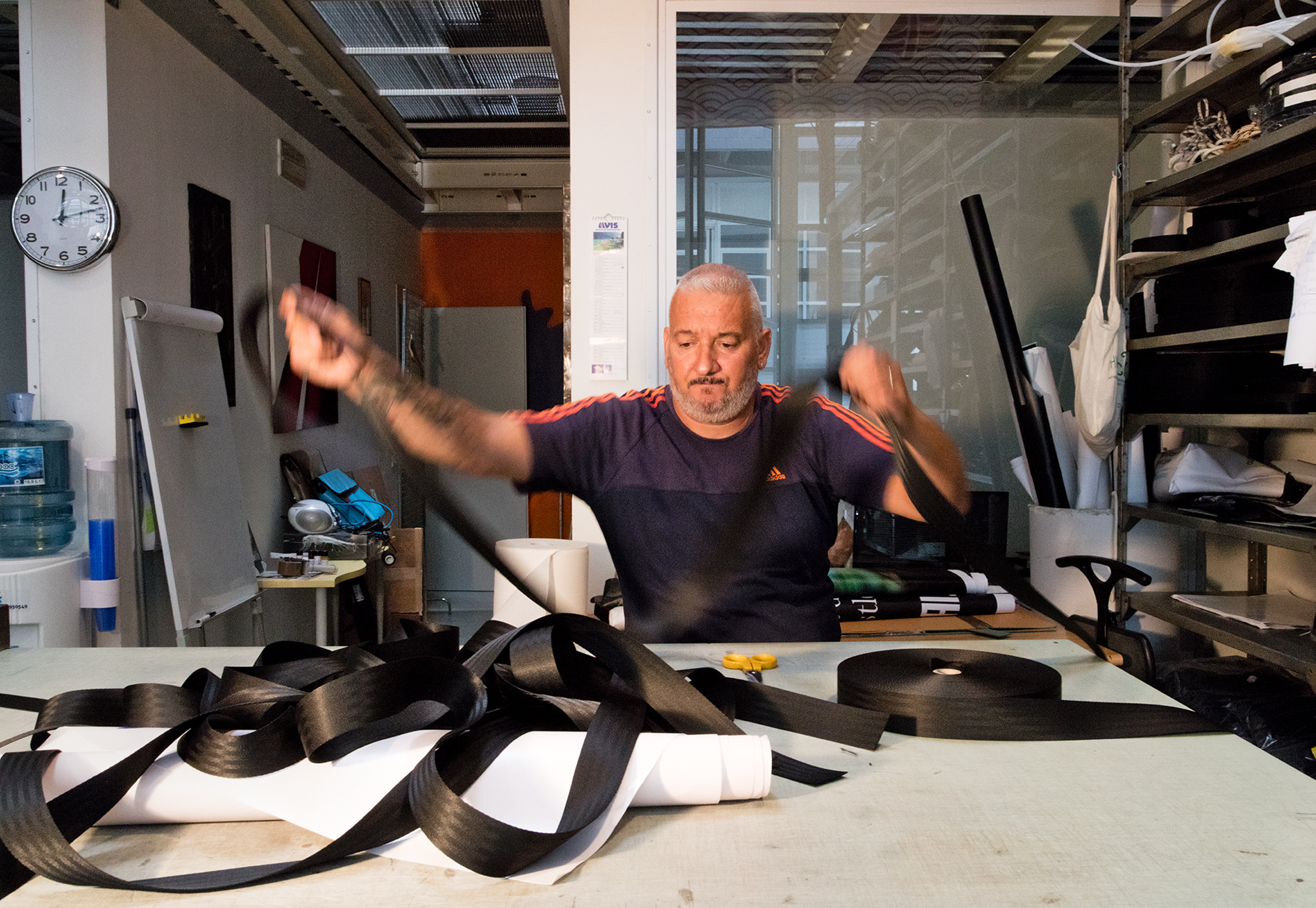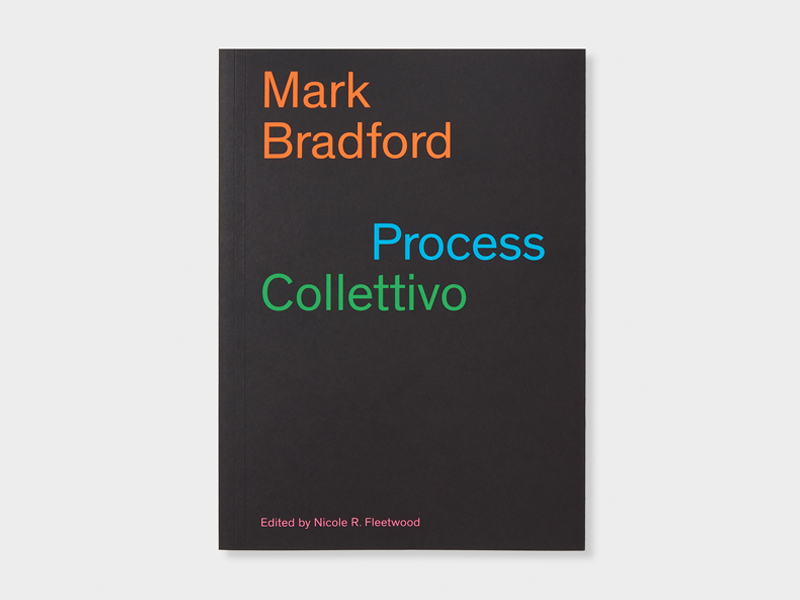Books
Laboratories for Change
On Mark Bradford’s eight-year collaboration with the Rio Terà cooperative

Rio Terà’s cosmetics lab. Photos: Carlos Avendano, Agata Gravante and Damian Turner. Courtesy Hauser & Wirth Publishers
In 1994, a group of friends visited Alessandro Travagnin, a man who was then imprisoned in Casa Circondariale Santa Maria Maggiore in Venice, and began initiating craft projects to help with the boredom and isolation of incarceration. Out of this emerged Rio Terà dei Pensieri, a cooperative of incarcerated and formerly incarcerated people, as well as volunteers, who work together at Casa di Reclusione Femminile della Giudecca and Casa Circondariale Santa Maria Maggiore, Venice’s prisons for women and men.
In 2016, ahead of the Venice Biennale, where he represented the United States, artist Mark Bradford was interested in starting a project that would create a lasting social impact in the city and began searching for an organizational partner. He eventually found Rio Terà and embarked with it on Process Collettivo, a collaboration aiming to draw attention to the cooperative’s work and provide it with the resources to flourish. This is achieved primarily through a storefront that sells goods made by the collective in the prisons—thus providing funding for the non-profit—and offers both resources and employment for the previously incarcerated.
Eight years later, as Bradford’s involvement with the cooperative draws to a close, a new book titled Mark Bradford: Process Collettivo (Hauser & Wirth Publishers, 2024), edited by writer, curator and art critic Nicole R. Fleetwood, examines the project and Rio Terà more broadly, situating these activities within wider conversations about carceral studies and social practice art. To this effort, new essays by Asale Angel-Ajani, Elisabetta Grande, Mitchell S. Jackson and Jessica Lynne look critically at the Italian carceral system, the importance of creative practices inside prison and the history of community engagement projects undertaken by Black artists in the United States. In a conversation with former Rio Terà president Liri Longo, Bradford explains that this sort of work “has to come from an interest in humanity and people,” in allowing those made invisible to appear and be heard.
Indeed, central to the book are new interviews with incarcerated and formerly incarcerated members of Rio Terà. In the spirit of Bradford’s intention, excerpts from those interviews are reproduced below, alongside interviews with Rio Terà members conducted in 2017, after Process Collettivo’s first year. These interviews have been translated from Italian and edited for clarity. Several of those interviewed have requested that their names not be used; out of respect for their privacy and for the sake of consistency, individuals are identified by first initials throughout.

The cooperative’s produce garden

The bag manufacturing lab
n.
In prison, time passes slowly. It is marked by a heavy dose of routine: every day is the same as the last. The fact that I am one of the few people lucky enough to have a career path helps the time pass more quickly. . . . Two months ago, thanks to Rio Terà and Article 21, a recognized prison mandate, I started working outside the institution four days a week. Now the weight of prison life has decreased, including the stress and anxiety. In fact, it is all gone, and I am left to think only about the future and how I will use this opportunity going forward.
m.
I first encountered the cooperative in the Giudecca prison, where I worked in the cosmetics lab. My first impressions were very good—it was a positive thing, maybe one of the most positive things in an environment like prison. I was involved for seven years total, first working in the cosmetics lab, and then as a salesclerk at the Process Collettivo storefront when I was out on an alternative measure. Now I have left Venice and returned to my home country, where I am an entrepreneur, together with my family.
I felt lucky to be able to work, especially for this cooperative; in this context, there were not only working relationships but also a great humanity, and opportunities for exchange and dialogue that I found very useful on my path. I had very good relationships with many people—both the operating staff and the volunteers. While still in prison, thanks to permits of leave for events or for work, I slowly began to “explore” Venice. Later, when I got out, I felt welcomed by everyone, and I got along well in the city. Working in the store, in contact with the public, I met many people, some of whom even became friends. It was very important for me to work in this cooperative, both in and out of prison.
j.
I was incarcerated in Venice when I heard about the cooperative, but then I got out, and I didn’t meet them directly. Two years later, I was arrested again, and I was in a cell with a friend of mine who was working with them; through him, I got in touch and asked to work in the bag manufacturing lab. At that time, I was very happy to have the job, and it gave me a lot of satisfaction. I learned the craft; I found that I enjoyed sewing, learning new things and being creative. When I was in the workshop, sometimes I could even forget that I was in prison.
In the cooperative, I was able to experience creativity, the satisfaction of inventing new things. . . . I had the time and means to know myself better and to understand what I want to do. Both inside and when I got out, there was always someone to listen, to help me think and reflect. . . . Now I’m thinking of new projects of my own to carry on from this experience.

Mark Bradford: Process Collettivo is available to purchase from Hauser & Wirth Publishers
g.
Joining the cooperative meant, yes, working, but also having relationships with the staff and exchanging ideas and conversations. This slowly helped me regain confidence in myself and in the fact that there are good people. . . . I have established many friendships with workers in nearby shops, bars and restaurants and with people who live in the area and drop by. Over the years, we have had many loyal customers who always come back— Venetians, people from other Italian cities and tourists. I feel lucky, because we have become like a family.
f.
I liked working in the cosmetics lab right away because I was given the opportunity to learn so many new things that I hadn’t had any experience with before. . . . I feel fulfilled. I have learned the value of work and commitment and . . . I can see that I will have an opportunity when I get out of prison. I have made my family happy as well. I took the chance that was given to me by the prison to change my life. I wish that all incarcerated women could have the same opportunity I have had, the courage and the willpower to fight back and move forward, projecting themselves into a better life.
d.
Working inside the prison is the only outlet and potential for growth that incarcerated people have. Fortunately, Book cover courtesy Hauser & Wirth Publishers there are organizations inside prisons that are like an invisible thread, linking the world of incarceration to the reality of outside life and work, preparing and supporting us as women. This is the message I want to emphasize, which I hope all women will pick up: the negative experience of prison can allow them to give sense to their futures by exhibiting grit, courage . . . and the possibility to start living life as a free person!
s.
I was introduced to the Rio Terà dei Pensieri cooperative and the Process Collettivo project while I was in the men’s prison. It was 2019. I asked to participate in the bag manufacturing course, so I started attending the lab. I felt right away that this would help me both inside and out of the prison. I got along well right away. I worked in the lab making bags and accessories from recycled PVC, learning how to sew and manage the production of orders. Going to the workshop every day was very important to me. After getting out on an alternative measure (I am on probation with social services), I continue to volunteer one day a week in the bag manufacturing lab outside the prison, so I see my colleagues, the Rio Terà staff, and so I don’t lose my sewing hands. You never know!
Working has allowed me to meet so many people, to have someone to talk to and confide in, beyond the incarcerated people like me. Some feel closer to me than brothers. I’m a touchy person, and in my life, I have always worked, but I never held a job for more than a couple of months—it was enough for anything to happen, and I would quit. With the cooperative, I became calmer and more patient. I learned to have more respect for myself, and this allowed me to have more respect for others as well. For me, this experience was not just about work; it made me reflect on who I was, who I am and who I can be.
–
Jake Brodsky contributed to this article.
